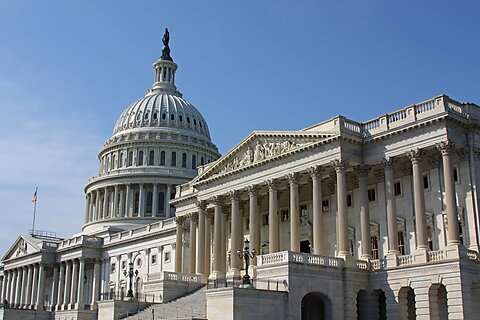
Romina Boccia and Tyler Turman
Democrats have instigated a government shutdown by rejecting a clean continuing resolution and demanding that Republicans agree to extend the Obamacare COVID-19 subsidies and reverse the modest Medicaid spending restraints enacted under President Trump’s “One Big Beautiful Bill Act” (OBBBA). Their opposition to reductions in health care spending, though predictable, underscores what makes the July reconciliation legislation significant.
Though bloated with deficit-worsening spending and tax provisions, the OBBBA also made the most significant changes to the federal safety net since 1996. While a far cry from returning responsibility for welfare programs to states, localities, and private charitable organizations, Republican reforms aim to tighten eligibility, reinforce work requirements, and curb misuse in Medicaid and the Supplemental Nutrition Assistance Program (SNAP), two of the fastest-growing welfare programs.
Promoting Work and Reducing Improper Spending in Medicaid
The largest OBBBA welfare reforms apply to Medicaid. The Congressional Budget Office (CBO) projects that OBBBA’s reforms would reduce Medicaid spending by over $900 billion, including $325 billion from the work requirements alone, by 2034. Medicaid has grown into the single largest means-tested welfare program, with federal outlays increasing by 65 percent from 2016 to 2025 (see Figure 1) and costing over $909 billion in FY 2024, to provide health coverage for lower-income Americans.
In response to record-high caseloads fueled by able-bodied adults without dependents enrolling in the program, the OBBBA introduced the first-ever federal work requirements for Medicaid.
The reforms require able-bodied adults without dependents aged 19–64 to work or participate in other qualifying activities (e.g., educational programs, community service, or job training) for at least 80 hours per month.[i] These reforms aim to promote work and personal responsibility while refocusing taxpayer dollars toward low-income children, pregnant women, the elderly, and individuals with disabilities.
To enhance state accountability for waste, fraud, and abuse in Medicaid—which resulted in upwards of $1 trillion in improper payments between 2015 and 2024, according to an estimate by the Paragon Health Institute—OBBBA authorizes the federal government to withhold funds from states with high payment errors. The point of this penalty is to institute accountability for states that otherwise lack strong incentives to conduct proper eligibility and payment verifications.
Strengthening Work Requirements and Accountability in Federal Food Assistance
The CBO projects that OBBBA’s SNAP reforms will yield $186.7 billion in savings by 2034, 37 percent of which will come from the enhanced work requirements. The number of SNAP recipients has more than doubled since 2000 (see Figure 2) and serves 41.7 million people as of FY 2024.
The program’s recent growth has “far outpaced what population growth, the economy, and unemployment rates would predict” to quote Angela Rachidi, with federal spending soaring from $63 billion to $145 billion between 2019 and 2023.
In response to SNAP’s well-documented work disincentives, the OBBBA also expands the program’s pre-existing work requirements for able-bodied adults without dependents aged 18–54 to 18–64 and, like Medicaid, requires them to work 80 hours per month to qualify for SNAP benefits.[ii] Noncompliant recipients may only receive benefits for a maximum of three months within a three-year period.
SNAP, like Medicaid, also makes billions of dollars in improper payments each year. Of its nearly 11 percent improper payment rate in FY 2024, almost 82 percent was from overpayments, meaning that taxpayers are footing the bills for benefits that should never have been paid out. The OBBBA changes the program’s funding by reducing federal contribution to states’ SNAP administrative costs[iii] and adding a cost-sharing rule for states with high payment error rates.[iv] These reforms give state governments more incentive to curb misuse and strengthen program integrity.
Work Supports a Return to Self-Sufficiency
Although the OBBBA’s welfare reforms have drawn significant criticism, work requirements for Medicaid and SNAP enjoy broad public support. Work requirements also enhance the efficiency of welfare programs—they help lift people out of poverty, make public assistance programs more sustainable, and incentivize workforce participation while disincentivizing behaviors that lead to dependency.
The goal of government welfare spending, if it is to exist at all, should be to help people out of the mire of poverty, not encourage long-term dependency on government handouts. The OBBBA’s welfare reforms are significant and will yield up to $1.1 trillion in savings by 2034. However, those gains are dwarfed by the bill’s other provisions that will rack up $4 trillion in debt over the same period.
The bill merely slows the spending growth of Medicaid from $1.025 trillion to $864 billion by 2035 (see Figure 3) rather than make substantive cuts to the program or other drivers of the deficit, such as Medicare and Social Security.
While the OBBBA’s reckless expenditures leave much to be desired, its welfare reforms nonetheless provide a promising framework for future improvements that will further facilitate self-sufficiency for recipients, reduce taxpayer burden, and empower states to take greater ownership over their welfare programs rather than rely on the federal government for funding and policy design.
[i] Exemptions include pregnant women, those who meet SNAP/TANF work requirements, those with severe medical conditions, caregivers with dependents under 14 years old, American Indians and Alaska Natives, and the medically frail. Most states must implement the work mandates by January 1, 2027, and thereafter verify the work status of every recipient within one or more months of enrollment and subsequent redeterminations.
[ii] All exemptions for homeless individuals, veterans, and former foster care youths aged 18–24 were removed, exemptions for parents with dependents were tightened to only those with children under 14, and new exemptions for American Indians and Alaska Natives were established. Forty-eight states may only request work requirement waivers for localities with unemployment rates above 10 percent, while Alaska and Hawaii may do so if their rates exceed 1.5 times the national average.
[iii] Currently, the federal government covers approximately 50 percent of the administrative costs for SNAP. The OBBBA reduces this to 25 percent and increases the state and county share to 75 percent. This reform takes effect in FY 2027.
[iv] The share is determined by a state’s SNAP payment error rate. States pay 0 percent benefit costs when the payment effort is <6%, 5% when payment error is 6–8%, 10% when payment error is 8–10%, and 15% when payment error is >10%.







